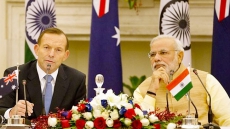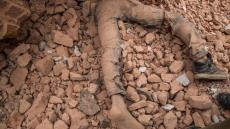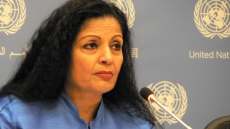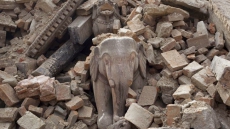The Pakistani security establishment is unlikely to be happy with Indian military aid to Afghanistan, and in the short run this could lead to more Pathankot-like attacks, says South Asia politics and security expert Christophe Jaffrelot.
"If India helps Afghanistan mililtarily, it could result in more Pathankots," Jaffrelot, a professor at the Centre for Studies in International Relations at the Paris Institute of Political Studies and author of several books on India and Pakistan, told IANS in an interview at the Jaipur Literature Festival on Thursday.
Indian Prime Minister Narendra Modi visited Kabul and agreed to provide helicopters to the Afghan forces, and the attacks on the Indian Air Force (IAF) base at Pathankot in Punjab and the Indian consulate in Mazar-e-Sharif in Afghanistan followed, he said.
"The Pakistan Army has not taken the Indian offer of helicopters in a very good way. They already have a constant temptation to use jihadi groups against India," said Jaffrelot.
"In the 10 years of (Congress rule), India gave Afghanistan aid but no military aid. You had talks, skirmishes, talks, skirmishes... India could live with that. It cannot live with a Pathankot every month," he said.
On Pakistan, Jaffrelot, whose most recent book "The Pakistan Paradox: Instability and Resilience" (2015), dealt with the country's curious paradoxes, said the world has to change its approach towards Islamabad.
"One solution will be to stop bailing it out... force it to reform its fiscal structure. The rich don't pay taxes there. The state has no resources for development," he said.

"The way must be trade, not aid," he said, noting increased trade with Pakistan will also create more employment in the populous country. "This has to be among the first steps."
Earlier, at a session titled "The Pakistan Paradox", Jaffrelot maintained that a crackdown by the Pakistani security establishment on certain military groups makes "no real difference" for India.
"Recently, the head of the Lashkar-e-Jhangvi was killed in an 'encounter'... The Pakistani forces only crack down on any group when it gets out of hand - and set up new ones. They still distinguish between 'good' and 'bad' Islamists."
Jaffrelot, who has also studied Indian politics, epecially the Hindu right and has authored "The Hindu Nationalist Movement and Indian Politics" (1996), "India's Silent Revolution - The Rise of the Lower Castes in North India" (2003), "Saffron Modernity in India: Narendra Modi and his Experiment with Gujarat" (2015), also cautioned against the rise of majoritarianism in India.
"There is a risk of India becoming a mirror image of Pakistan... it would not be a very wholesome prospect," Jaffrelot told IANS.
Noting it was a global trend with the success so far of Donald Trump in the race for the US presidential candidacy and right and far-right wing political parties in Europe, he said India had so far resisted this with its diversity and secularism.
"Majoritarianism, which would imply the majority community or Hindus are first-class citizens and minorities are not, can happen in practice, it dosn't need a constitutional change. Israel is an example. They have not changed the law, but still," he said, adding any such change would have implications.

"Things like 'ghar wapsi', beef ban, 'love jihad' and the like would lead to more estrangement, and 'ghettoisation' of the minority communities," he said,
Apart from the security aspects of such an outcome, India would lose its "moral high ground" and its "soft power" would diminish," he warned.




